It is perfectly normal to feel anxious about your baby’s safety and well-being. This sense of apprehension becomes even stronger when it comes to feeding paraphernalia. What if the bottle contains harmful chemicals? Or, what if it holds on to germs and smells that linger behind even after a vigorous scrubbing? With the best glass baby bottles, you do not have to worry about any of these.
Glass is probably one of the safest materials you could get for your bundle of joy. Unlike plastic, it is not surrounded by health or safety controversies. It is also exceptionally durable and environmental-friendly. Still, it is not without caveats. Read on to learn more about the best glass bottles for babies – including their pros and cons.
Best Glass Baby Bottles
Glass baby bottles are available in varying sizes and shapes to suit different needs, preferences, and concerns. If colic and gassiness are your problems, for instance, bottles with an integrated venting system are the way to go. If you want something easy to clean, then settle for wide-necked ones.
The size of the bottlehas something to do with your baby’s age and appetite. If they are less than three months or so, four- to five-ounce bottles will do. Meanwhile, they can graduate to larger bottles – or those that hold about nine ounces of milk – once their feeding requirements increase. You may have to pair it with the appropriate nipple as well.
| Product | Size | Included Nipple | Recommended Age | Price | ||
|---|---|---|---|---|---|---|
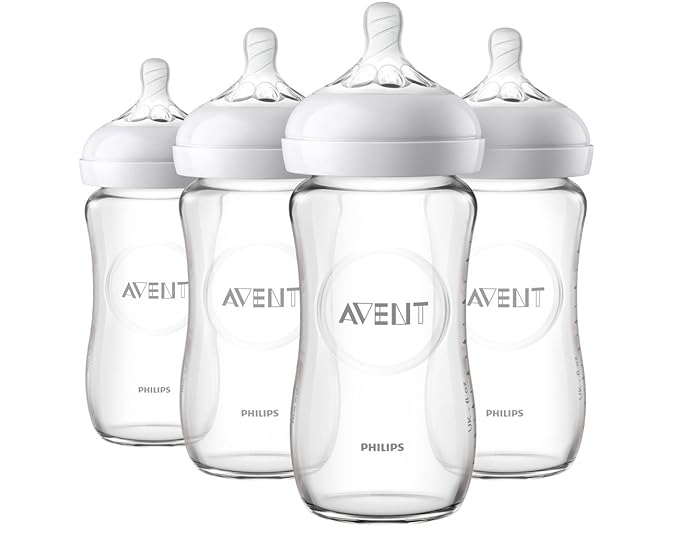 |
Best Overall: Natural Glass Baby Bottle by Philips Avent | 9 oz (266 ml) | Slow flow nipple | 0 to 3 months | $36.90 for a pack of four | Buy on Amazon |
 |
Most Durable: Feeding Glass Premium Proflo Vented Plus Bottles by Evenflo | 8 oz (237 ml) | Slow flow vented nipple | 0 to 3 months | $18.49 for a pack of six | Buy on Amazon |
 |
Best Anti-Colic: Options+ Wide-Neck Glass Bottles by Dr. Brown’s | 5 oz (148 ml) | Slow flow nipple | 0 to 12 months | $24.99 for a pack of three | Buy on Amazon |
 |
Best for Breastfed Babies: Closer to Nature Baby Bottle by Tommee Tippee | 9 oz (266 ml) | Slow flow nipple | 0 to 3 months | $25.99 for a pack of four | Buy on Amazon |
 |
Best for Older Babies: BPA-Free Glass Baby Bottle with Protective Silicone Sleeve by Lifefactory | 9 oz (266 ml) | Stage 2 (medium flow) nipple | 3 months and up | $16.99 | Buy on Amazon |
1. Best Overall: Natural Glass Baby Bottle by Philips Avent
- Retail Price:$36.90 for a pack of four (Click here to check the latest promotion)
- Size: 9 oz (266 ml)
- Included Nipple: Slow flow nipple
- Recommended Age: 0 to 3 months
The Philips Avent Natural Glass Baby Bottle is made of premium quality borosilicate glass for guaranteed durability. On top of that, it is resistant to heat and thermal shock as well. The silicone nipple is ultra-soft and sports a wide breast-shape to maximize comfort while promoting a natural latch. It even comes with an airflex valve to prevent the formation of air pockets. While this bottle includes a slow flow nipple, it is also compatible with nipples with larger hole sizes or faster flow rates.

2. Most Durable: Feeding Glass Premium Proflo Vented Plus Bottles by Evenflo
- Retail Price: $18.49 for a pack of six (Click here to check the latest promotion)
- Size: 8 oz (237 ml)
- Included Nipple: Slow flow vented nipple
- Recommended Age: 0 to 3 months
The Evenflo Premium Glass Baby Bottles is the way to go if you want an affordable yet heavy-duty feeding bottle. Made with tempered glass and food-grade materials, it is free from nasty chemicals, including BPA, PVC, polycarbonates, and phthalates, giving you peace of mind. You will also love the ergonomic design, which makes it easy to grip and clean. As a bonus, it also boasts premium venting to reduce gassiness and colic.
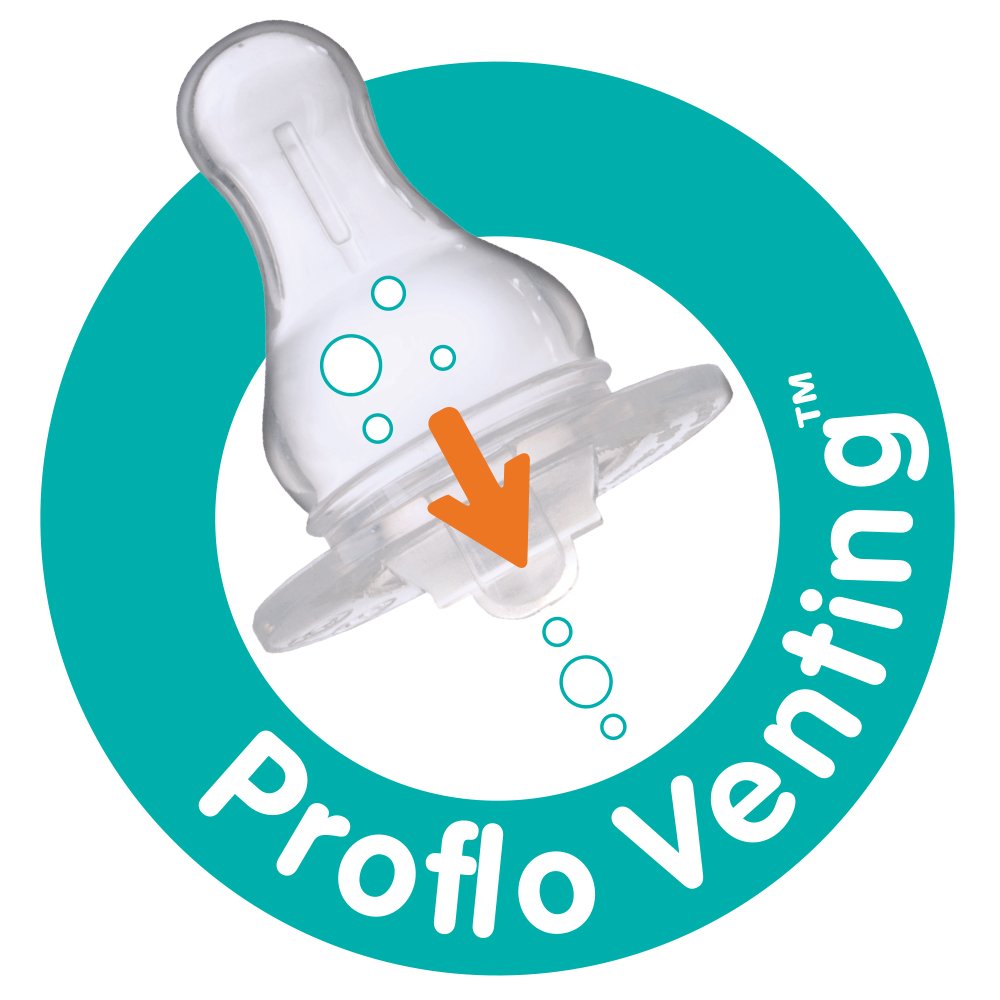
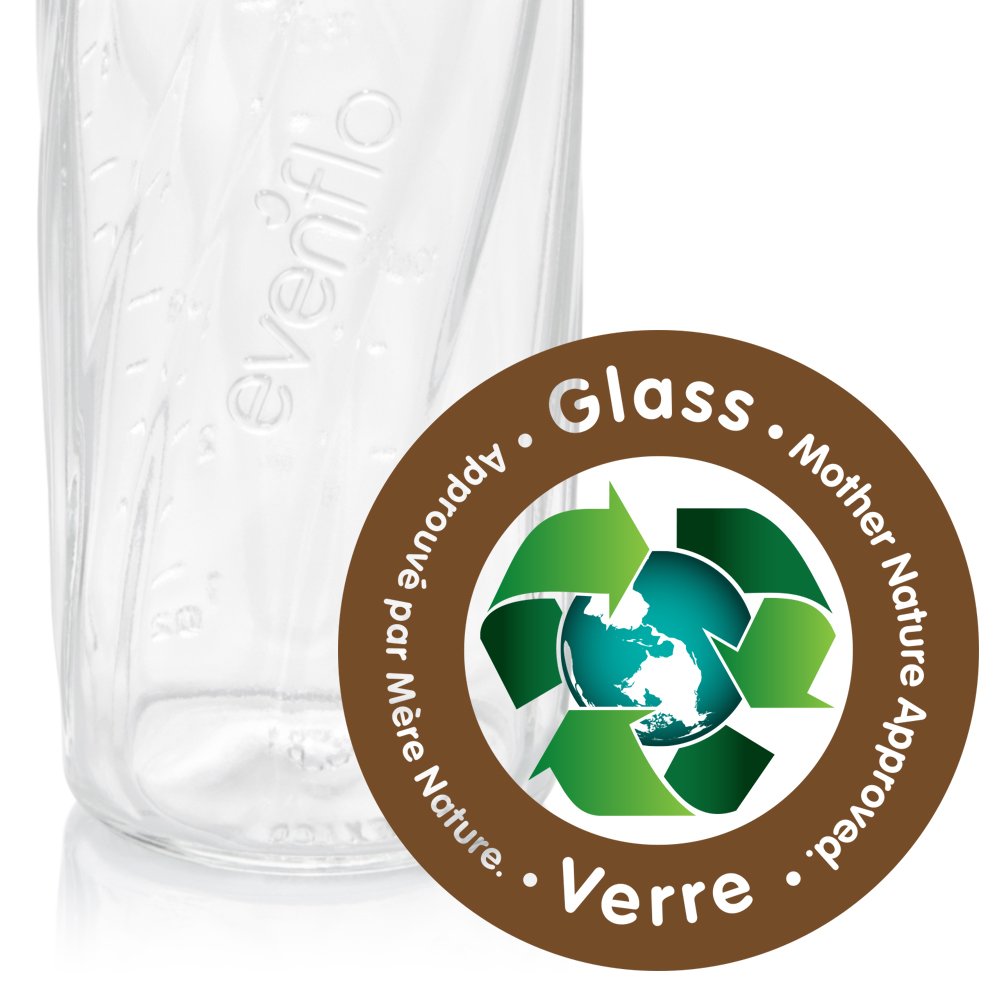
3. Best Anti-Colic: Options+ Wide-Neck Glass Bottles by Dr. Brown’s
- Retail Price: $24.99 for a pack of three (Click here to save up to 24%)
- Size: 5 oz (148 ml)
- Included Nipple: Slow flow nipple
- Recommended Age: 0 to 12 months
Dr. Brown’s Wide-Neck Glass Baby Bottle features an internal vent system, which is clinically proven to combat gas, spit-up, and burping. It ensures that your little one is comfortable during and after every feeding session. More impressively, the anti-colic venting also grows with your baby and can easily be removed once their feeding capacity develops further. Another standout feature is the natural nipple, which delivers milk at a consistent flow rate while encouraging a proper latch.
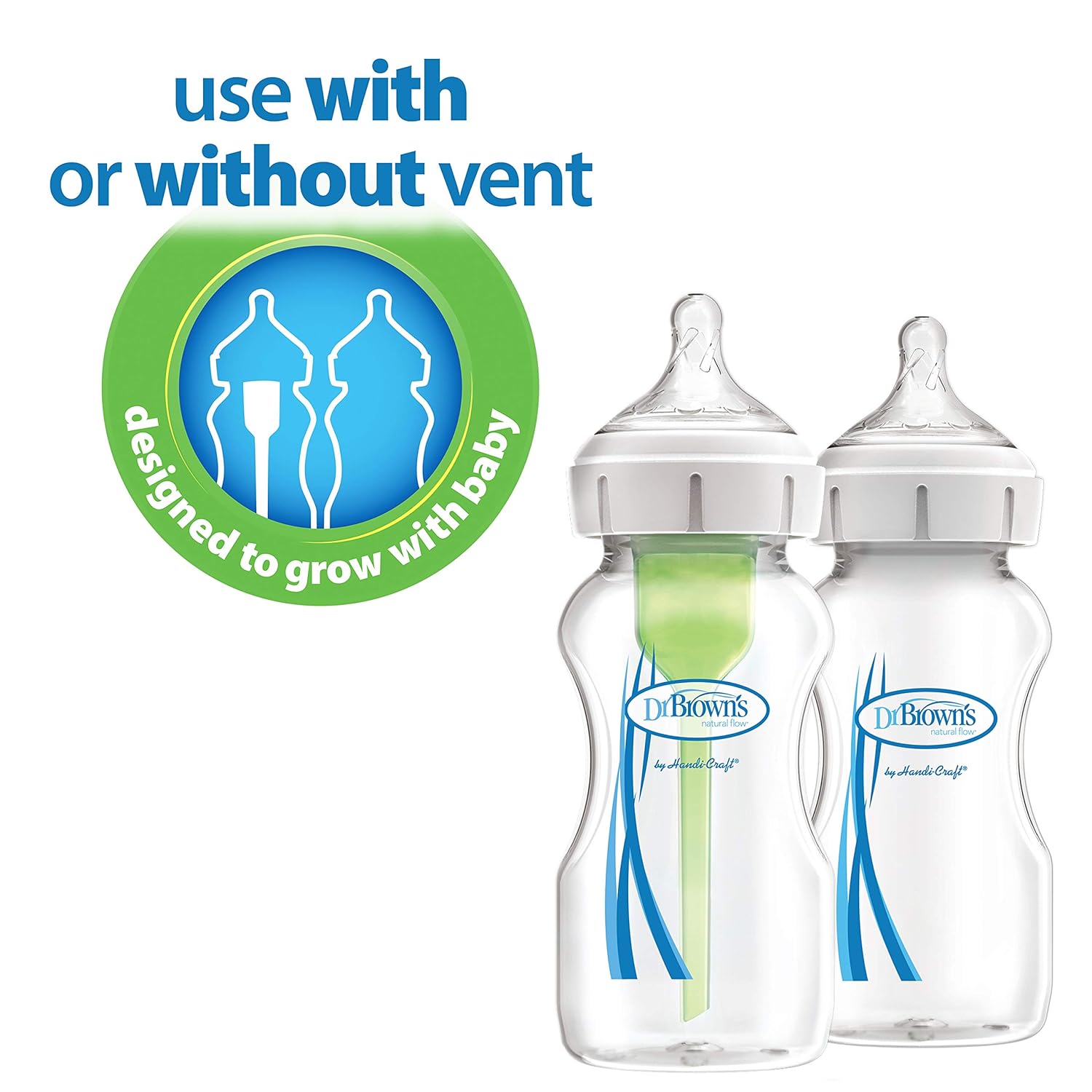
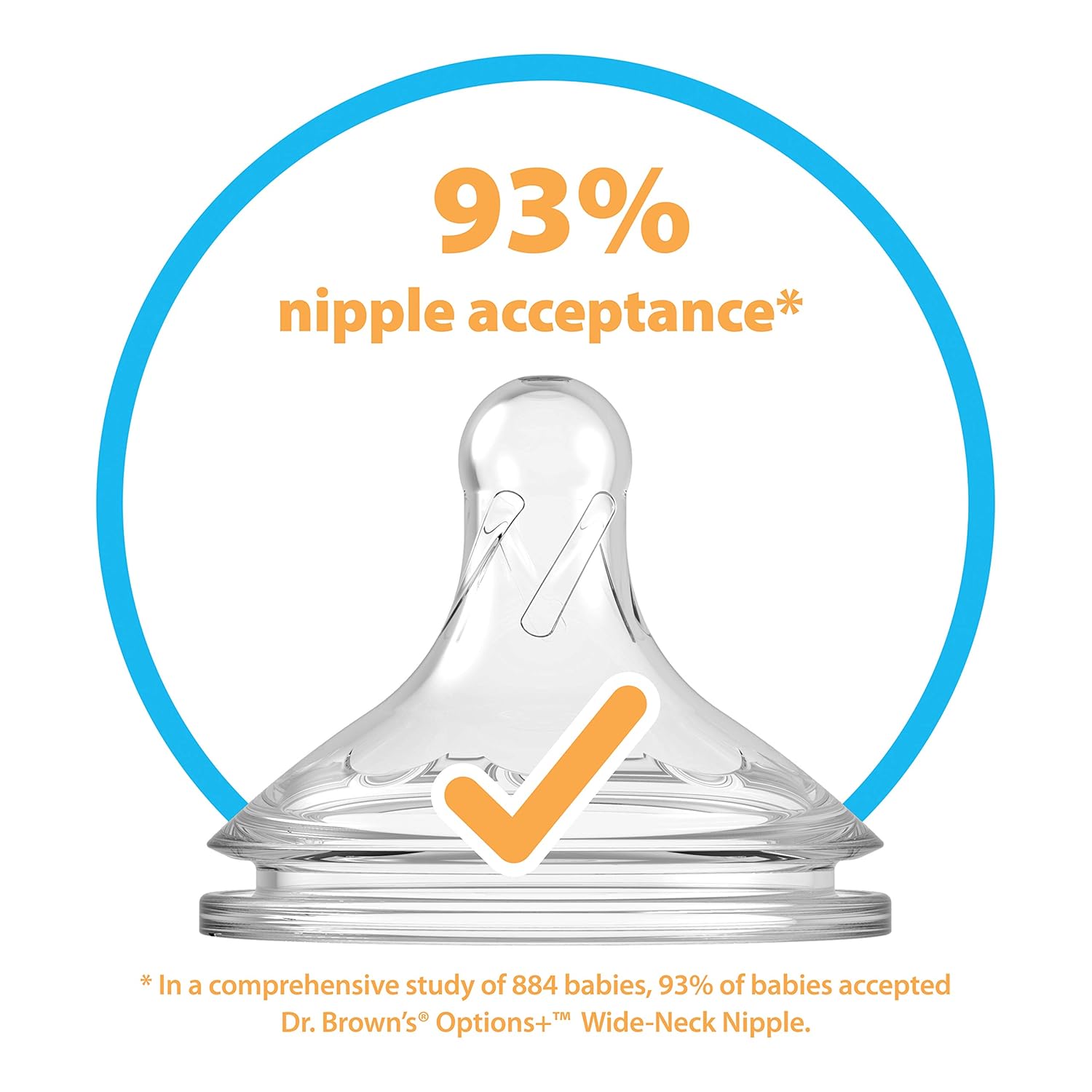
4. Best for Breastfed Babies: Closer to Nature Baby Bottle by Tommee Tippee
- Retail Price:$25.99 for a pack of four (Click here to save up to 33%)
- Size: 9 oz (266 ml)
- Included Nipple: Slow flow nipple
- Recommended Age: 0 to 3 months
Graduating from breast to bottle or want to regularly switch between the two? With the Tommee Tippee Closer to Nature Baby Bottle, nipple confusion is a thing of the past. The included silicone nipple is correctly contoured, velvety smooth, and flexible, recreating the feel of a mother’s nursing breast. Trust us, your baby will not even notice the difference. To sweeten the deal, it is also outfitted with optimum venting to avoid unwanted air intake.

5. Best for Older Babies: BPA-Free Glass Baby Bottle with Protective Silicone Sleeve by Lifefactory
- Retail Price:$16.99 (Click here to check the latest promotion)
- Size: 9 oz (266 ml)
- Included Nipple: Stage 2 (medium flow) nipple
- Recommended Age: 3 months and up
The Lifefactory Glass Baby Bottle is perfect for mature babies who are learning how to hold the bottle on their own. The medical-grade silicone sleeve makes the bottle easy to clutch – even for your baby’s tiny hands. At the same time, it also enhances the durability of the product and creates a tactile non-slip gripping surface. Meaning, the bottle is less likely to fall in the first place. Aside from being functional, the silicone sleeve also provides a bright pop of color, making feeding time more attractive even for the fussiest of babies.


Glass Baby Bottles FAQs
How Do You Clean and Care for Glass Baby Bottles?
You can clean glass baby bottles using warm water, mild baby dish soap, and a high-quality bottle brush with soft bristles. Alternatively, you can also use the top rack of your dishwasher. Do refer to the manufacturer’s cleaning recommendations.
Are Glass Baby Bottles Better Than Plastic?
Yes – and in more ways than one. The most obvious advantage is that glass baby bottles are much safer than plastic ones. Since they do not contain plastic, they are naturally free from BPA. Back in 2012, the FDA banned this industrialchemical due to potential health risks. While plastic baby bottles manufactured after 2012 should be BPA-free, those produced earlier may still contain the noxious compound. Glass is also inert, which means that it will neither leach harsh chemicals to your baby’s milk nor retain unwanted odors.
Do Glass Baby Bottles Break Easily?
Glass baby bottles are incredibly durable and hard-wearing. With proper use and handling, they can last for several years. Unfortunately, they are prone to breakage and can shatter to pieces when dropped from a certain height. That is why it is critical to handle glass bottles with extreme care. Likewise, you need to store them properly. It rings especially true if you plan to bring them on your next trip.
Do You Need to Sterilize Glass Baby Bottles?
It is recommended to sterilize glass baby bottles before the first use. After that, there is generally no need to do so. This practice was only mandatory in the past – back when the local water supply still tended to be unreliable. Nowadays, hot, soapy water is all you need to get rid of milk remnants and bacteria. Of course, you can also use a baby bottle brush for superior cleaning.
But if your little one is under three months old, was born prematurely, or is immunocompromised, you may need to sterilize the bottle every day. Consult your baby’s pediatrician to be sure. To sterilize, simply disassemble the clean bottle, then place it in a pot filled with water. Turn on the heat and bring to a boil. Keep the water boiling for five minutes to get rid of harmful microorganisms.
Should You Use a Glass Baby Bottle?
Glass baby bottles are perfect if you want to make sure that your baby won’t ingest anything toxic. Being inert means that they are an absolute breeze to clean, which is good news for busy parents. Furthermore, they are ideal if you want a durable, cost-effective, and eco-friendly option.
Despite these appealing benefits, glass baby bottles are not for everyone. Aside from being fragile, they tend to be heavy as well. So, if you frequently travel, they may not be the best option. Most glass bottles are ill-suited for self-feeding, too. Not only are they hard to grip, but they can also injure your baby upon shattering. Finally, they tend to be pricier and much harder to come by.
With that said, make sure to weigh in both the pros and cons before stocking up on glass baby bottles.
Glass Baby Bottles Are a Durable, Non-Toxic Feeding Solution
There are so many bottle-feeding options in the market, but glass baby bottles are undoubtedly one of the safest and the most reliable. Being chemical-free and inert means that youdo not have to worry about exposing your child to anything toxic. Furthermore, they are long-lasting, cost-effective,and environmentally-friendly, so you get to save precious bucks while reducing your plastic footprint. But like any other product, glass baby bottles also have a few downsides. It is important to be aware of them for the ultimate feeding experience.
